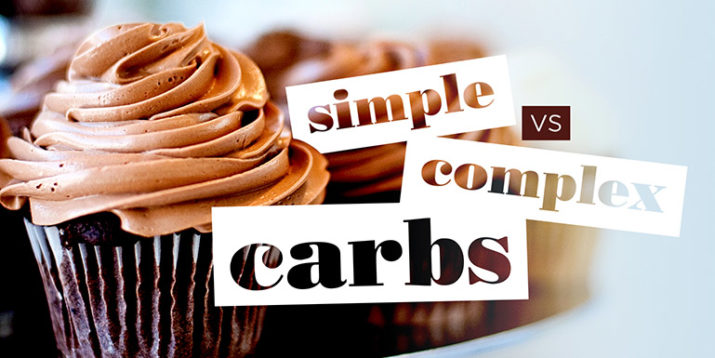The Difference Between Simple Carbs and Complex Carbs

As you likely know by now, not all carbs are created equal. Whether you love carbohydrates or choose to limit them, you need to know how to tell the difference between simple carbs and complex carbs.
Simply put, complex carbs are usually whole foods that contain fiber; simple carbs contain added sugars but little to no fiber.
Keep reading for the lowdown on simple carbs vs. complex carbs, why fiber matters, and the best carbs for a healthy diet.
What Are Carbohydrates?
First up, let’s define carbs: Carbohydrates are one of the three macronutrients — protein and fat being the others.
Carbohydrates, or carbs for short, are a major source of energy for your body.
The 2020–2025 Dietary Guidelines for Americans recommend that 45 to 65 percent of your total calorie intake should come from carbs.
(Fun fact: BODi’s Portion Fix nutrition program includes a balance of roughly 40 percent carbohydrates and 30 percent each of protein and fat, which is great for either weight loss or maintaining your current healthy lifestyle.)
Understanding carbs — and which ones should be limited in your diet — can be tricky because there are different types and so many aspects to consider: simple vs. complex, sugar vs. starch, and even soluble vs. insoluble fiber.
In the case of carbs, complex is better.
Why Eat More Complex Carbs Than Simple Carbs?

There are two main types of carbohydrates: complex and simple — and we should be eating more of the former than the latter.
Why should we eat more complex carbohydrates than simple carbohydrates?
While these two classifications are not synonymous with “healthy” carbs and “unhealthy” carbs per se (more on that later), they are indicative of the chemical structure of these carbs and how easily your body breaks them down.
What Are Complex Carbs?
Complex carbohydrates are different from simple carbs in that they’re made up of longer chains of sugars.
Because of this, they take more time to break down, which allows for a slower, more gradual release of energy.
Whole grains, legumes, fruits, and starchy vegetables are all examples of complex carbohydrates.
Complex carbs have fiber and vitamins, minerals, and phytonutrients in addition to providing energy in the form of calories.
The carbs we eat should mainly fall under the complex category, along with naturally occurring simple carbs (fruit, vegetables, and milk) instead of refined carbs (white bread, pasta, etc.) or foods with added sugars (candy, soda, and baked goods).
Why Do We Need Fiber?
Fiber is an important factor in carbohydrates that’s worth mentioning; it’s typically an indicator of a simple carb vs. a complex carb.
In general, fiber keeps you regular and keeps you feeling fuller longer. Fiber only comes from plants — whole grains, beans, fruit, vegetables, etc. — and it isn’t digested.
Americans are coming up short when it comes to fiber; we’re currently only eating about 16 grams of it each day.
Adults age 50 and younger should aim for 38 grams (men) and 25 grams (women) of fiber per day.
Men and women over the age of 50 should aim for 30 and 21 grams, respectively, per day.
There are two basic types of fiber, soluble and insoluble, and we need them both.
Soluble fiber becomes a gel during digestion, and it’s water-soluble. Found in foods like beans, oats, and fruit, it helps slow digestion and softens stool.
Insoluble fiber is not soluble in water. This type is found in whole grains, fruits, veggies, and nuts (think: roughage), and it’s what helps keep you regular.
In addition to soluble and insoluble fiber, there’s another type of fiber you may not have heard of.
What Is Resistant Starch?

Found in oats, beans, and bananas, resistant starch is not digested, but it is fermented by bacteria once it reaches the large intestine.
Resistant starch turns into short-chain fatty acids once fermented and creates an optimal environment for healthy bacteria in our gut, allowing them to flourish. It also helps satiety, according to research.
Since fiber plays such an important role in maintaining our health, carbs that contain this nutrient are generally considered to be “healthy.”
Eat More of These Complex Carbohydrates:
Complex carbs provide fiber, vitamins, minerals, and phytochemicals, and they are plant-based.
Although the yellow container in Portion Fix is for carbs, the foods in the purple (fruit) and green (vegetables) categories also provide carbohydrates.
- Amaranth
- Bananas
- Blueberries
- Black beans
- Cantaloupe
- Cucumber
- Kale
- Millet
- Pears
- Pinto beans
- Quinoa
- Red lentils
- Spinach
- Strawberries
- Sweet potatoes
- Whole-wheat pasta
What Are Simple Carbs?

So if fiber may be an indicator of a complex carb, what are simple carbs?
Essentially, they’re carbohydrates that are quickly digested, low in fiber and nutrients, and potentially high in added sugar.
Think: refined, overly processed “white” grains and foods or drinks with added sugars. They’re basically carbs that aren’t whole foods found in nature.
Simple carbs are basic, short-chained groups of sugars.
Because they’re made up of shorter chains, it’s easier for them to break down in your body, which results in a sudden rush of energy soon after you eat them.
This doesn’t mean that all simple carbs are refined; some are found in whole foods.
Fruit and milk are made up of naturally occurring simple sugars, but they also provide vitamins and minerals (and, in the case of fruit, fiber).
On the other hand, more processed foods and beverages like candy bars and soda are simple sugars that come from added sugars.
These “junk foods” don’t offer any added nutritional benefit beyond the calories (or energy) they provide. Simple carbs are usually treats, not foods you include in your everyday diet.
There can be a place for these types of carbs in a diet, for example, as fuel before or after a workout.
It’s important that athletes have quickly digestible carbs, which is why you often see them drinking sugary beverages or eating candy before, during, or after races.
Those simple sugars can be stored as glycogen, which their bodies can then rapidly convert to energy as needed.
While athletes wouldn’t fuel their bodies with these sugary foods all the time, there is a time and place for them.
In general, however, these carbs should be limited because they don’t have a lot to offer and can be high in added sugars.
Carbohydrates You Should Limit
Americans are overdoing it when it comes to added sugars.
The American Heart Association recommends that women limit the amount of added sugar in their diet to six teaspoons per day (that’s about 100 calories) and nine teaspoons per day for men (about 150 calories).
We’re eating more than 20 teaspoons (about 350 calories) of added sugar each day!
These are some of the more common sugary carbs to limit:
- Candy
- Chocolate candy bars
- Cola and other sodas, as well as other sweetened beverages like tea and coffee
- Pastries, cupcakes, and most baked goods
- Refined white bread and pasta
- Sports drinks (except when used by endurance athletes)
- White rice
How to Choose Your Carbohydrates
If you’re going to maintain a healthy diet, you need to know Nutrition Facts labels can tell you a lot when it comes to understanding the types of carbohydrates in a food.
First, start with the ingredients, which are listed in order by weight, from greatest to least.
Look for ingredients that include whole grains, whole wheat, whole fruit, or vegetables, and don’t include added sugar like high-fructose corn syrup, maltose, brown sugar, etc.
Whole fruit is a safe bet when it comes to healthy carbs. Avoid fruit canned in syrup as well as frozen and dried fruit with added sugars.
Also, fruit juice may offer nutrients but is void of fiber, so you’ll want to limit the amount you drink.
It’s also important to look at the actual nutrient content in the food. Total carbohydrates are listed on the label along with fiber and sugars.
Sugars are broken out to show which are naturally occurring (e.g., lactose from milk and fructose from fruit) and which are added sugars.
Before you cut out carbs completely (or start filling up your plate), read: Are Low-Carb Diets Effective for Weight Loss?
The Final Word on Carbs
Carbs play an important role in a healthy diet when eaten in the right portions.
Be sure you’re choosing complex carbs over simple ones — though you can reserve those for a rare treat if you prefer.
